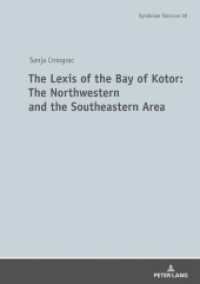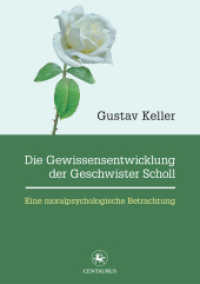- ホーム
- > 洋書
- > 英文書
- > Transportation
Full Description
Urban Freight Analytics examines the key concepts associated with the development and application of decision support tools for evaluating and implementing city logistics solutions. New analytical methods are required for effectively planning and operating emerging technologies including the Internet of Things (IoT), Information and Communication Technologies (ICT), and Intelligent Transport Systems (ITS).
The book provides a comprehensive study of modelling and evaluation approaches to urban freight transport. It includes case studies from Japan, the US, Europe, and Australia that illustrate the experiences of cities that have already implemented city logistics, including analytical methods that address the complex issues associated with adopting advanced technologies such as autonomous vehicles and drones in urban freight transport.
Also considered are future directions in urban freight analytics, including hyperconnected city logistics based on the Physical Internet (PI), digital twins, gamification, and emerging technologies such as connected and autonomous vehicles in urban areas. An integrated modelling platform is described that considers multiple stakeholders or agents, including emerging organisations such as PI companies and entities such as crowd-shippers as well as traditional stakeholders such as shippers, receivers, carriers, administrators, and residents.
This book
Presents procedures for evaluating city logistics technologies and policy measures
Provides an overview of advanced modelling approaches, including agent-based model and machine learning
Highlights the essential features of optimisation and simulation models applied to city logistics
Discusses how models incorporating more uncertainty and dynamic data can be used to improve the sustainability and resilience of urban freight systems
The book is ideal for graduate students in civil and environmental engineering and logistics management, urban planners, transport engineers, and logistics specialists.
Contents
Part I. Methods. 1. Introduction. 2. Data collection and analyses. 3. Geographic information systems and spatial analysis. 4. Optimisation. 5. Multi-agent simulation with machine learning. 6. Reliability and resilience. 7. Evaluation. Part II. Applications. 8. Autonomous Vehicles and Robots. 9. Access management and pricing. 10. Environmental sustainability. 11. Disruption of Networks. 12. Future directions.






